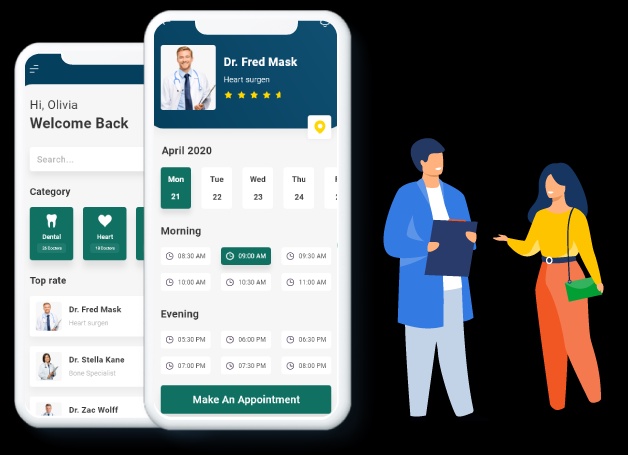Introduction
In today's digitally-driven healthcare landscape, telemedicine has emerged as a transformative solution to improve patient access to healthcare services. However, with the convenience of telemedicine comes the critical need to protect sensitive patient data. The security of telemedicine apps is paramount, as they handle a wealth of confidential information, from medical records to personal identifiers. In this comprehensive guide, we'll delve into the world of telemedicine app security, exploring the challenges, best practices, and cutting-edge solutions that ensure patient data remains confidential and protected.
Understanding the Significance of Telemedicine Security
The proliferation of telemedicine apps development company has brought medical care to the fingertips of patients worldwide. Yet, as the popularity of these apps surges, so does the potential for data breaches and privacy violations. The consequences of a security breach in a telemedicine app can be devastating, affecting not only patients but also the reputation and credibility of healthcare providers and app developers.
The Stakes Are High
Patient Confidentiality: Telemedicine apps store and transmit sensitive patient information, including medical histories, diagnoses, and treatment plans. A breach can lead to unauthorized access to this data, compromising patient privacy.
Legal and Ethical Implications: Healthcare organizations and telemedicine app developers must adhere to stringent legal and ethical standards, such as the Health Insurance Portability and Accountability Act (HIPAA) in the United States. Violating these regulations can result in severe penalties.
Reputation Damage: A security breach can damage a healthcare provider's reputation, eroding patient trust. Patients may avoid using telemedicine services altogether, potentially impacting the quality of healthcare delivery.
Common Threats to Telemedicine App Security
Before we delve into safeguarding patient data, it's crucial to understand the common threats that telemedicine apps face:
Data Interception
Hackers can intercept data during transmission, gaining access to patient information while it's in transit. This threat underscores the importance of robust encryption protocols.
Unauthorized Access
Weak authentication mechanisms can allow unauthorized users to access the app and patient records. This includes improper handling of user credentials.
Inadequate Encryption
Data stored on servers should be encrypted to thwart unauthorized access. Failing to encrypt data exposes it to theft in case of a breach.
Vulnerable APIs
Telemedicine apps often rely on APIs to exchange data with external systems. Vulnerable APIs can be exploited by attackers.
Poorly Designed Interfaces
User interfaces that do not prioritize security can enable attackers to execute cross-site scripting (XSS) or other injection attacks.
Best Practices for Telemedicine App Security
Protecting patient data in telemedicine apps requires a multi-faceted approach. Here are best practices that healthcare providers and app developers should implement:
HIPAA Compliance
Adhere to the regulations outlined in HIPAA to ensure the secure handling of patient information. This includes encrypting data, maintaining audit logs, and conducting regular security assessments.
Robust Authentication
Implement strong authentication mechanisms, such as multi-factor authentication (MFA), to verify the identity of users. This reduces the risk of unauthorized access.
Encryption
Utilize end-to-end encryption to secure data both in transit and at rest. This ensures that even if data is intercepted, it remains unreadable to unauthorized parties.
Regular Security Audits
Conduct frequent security audits and vulnerability assessments to identify and address potential weaknesses in the app's security infrastructure.
Secure APIs
Ensure that APIs used for data exchange are rigorously tested for vulnerabilities and implement access controls to prevent unauthorized access.
User Education
Educate both patients and healthcare providers about the importance of strong passwords and responsible use of the telemedicine app.
Secure Coding Practices
Implement secure coding practices throughout the development process, including input validation and escaping to prevent XSS attacks.
Data Backup and Recovery
Regularly back up patient data and establish a robust data recovery plan to minimize downtime and data loss in the event of a breach.
Advanced Solutions for Telemedicine App Security
As cyber threats evolve, so must our security measures. Here are some advanced security solutions and technologies to consider:
Blockchain Technology
Blockchain's decentralized and tamper-resistant nature can enhance the security of patient data, ensuring its integrity and preventing unauthorized alterations.
Artificial Intelligence (AI) and Machine Learning (ML)
AI and ML algorithms can analyze user behavior patterns to detect anomalies that may signify a security breach. They can also help in predictive threat modeling.
Biometric Authentication
Leverage biometric authentication methods like fingerprint recognition or facial recognition to enhance user verification.
Security Information and Event Management (SIEM) Systems
SIEM systems provide real-time monitoring and analysis of security events, enabling rapid response to threats.
Penetration Testing
Regularly engage in penetration testing, where ethical hackers attempt to identify and exploit vulnerabilities in your app, helping you proactively address weaknesses.
The Role of SISGAIN in Telemedicine App Security
At SISGAIN, we recognize the critical importance of telemedicine app security. Our team of expert developers is well-versed in the latest security measures and technologies. We are committed to helping healthcare providers and organizations safeguard patient data, ensuring that telemedicine apps meet and exceed the highest security standards.
Conclusion
As telemedicine continues to revolutionize healthcare, the security of patient data remains paramount. The consequences of a security breach can be far-reaching, affecting patient trust, legal compliance, and the reputation of healthcare providers and app developers. By implementing best practices, staying informed about evolving threats, and embracing advanced security solutions, we can ensure that telemedicine remains a secure and reliable healthcare delivery option in the digital era. At SISGAIN, we are dedicated to supporting healthcare organizations in this critical mission, ensuring that patient data is always safe and confidential. Together, we can build a safer and more accessible future for healthcare through telemedicine.


No comments yet